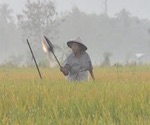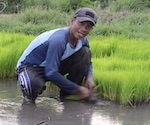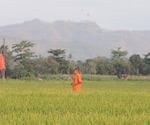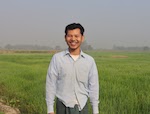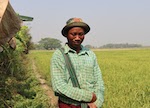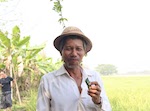Farmers speak!

Collage of farmers in conversation. Order from top left to bottom right: Bah Arif, Bah Jaya, Mak Idah, Chit Kaung, Soe Win, U Chit Maung, Ibu Sarinem, Pak Rohmat, Pak Suradi
Farmers speak!
In a pandemic stricken world where acts of resistance have largely been curtailed, conversations with farmers become attempted acts of healing where they share about their agricultural concerns. Through a series of free flowing dialogues guided by curious questions around (lost) local rice varieties and farming practices, these conversations serve as a medium to recognise the underlying body language, knowledge, nuances and tones embedded within the spoken words.
Presenting the conversations in the rawest forms, the audience are invited to dissect, interpret and read them while informal didactic knowledge surface during the honest interactions with the farmers.
Conversations with local rice farmers at Hmawbi (northwest of Yangon, Myanmar), across Myanmar, Yogyakarta (Central Java, Indonesia) and Sukabumi (West Java, Indonesia), are the first entry points towards acknowledging the local rice seeds situations and rice farmers' plights today.
Kokkoya Organics, together with its producer network, surveyed 15 farmers across Myanmar over the phone calls* as we find out more about the state of local rice varieties they grow and their rice agricultural practices.
*The dialogues are in Burmese. For a translated transcript of the dialogues, please refer to the link under the audio player.
A special dialogue session was conducted as part of Kokkoya Organics' Rice Donation drive where receivers of the rice donation were invited to share their personal encounters and experiences^. Selected dialogues offering individual insights and encounters are translated.
^The dialogues are in Burmese. For a translated transcript of the dialogues, please refer to the link under the audio player.
ဆန်မန်် San Mann
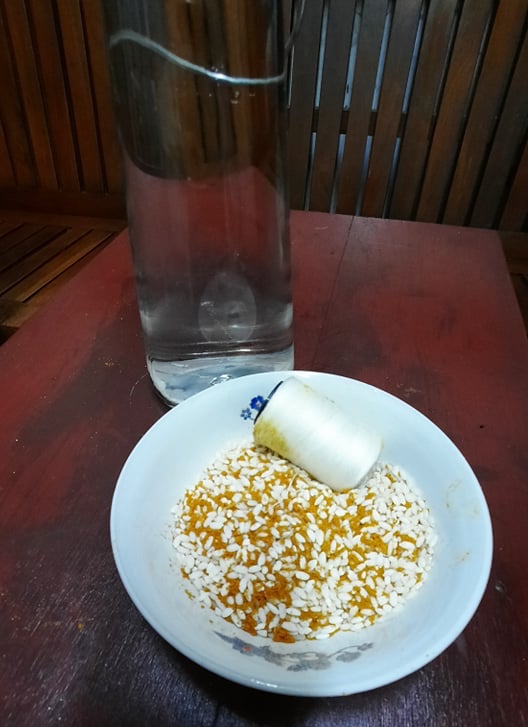

Left: San Mann [consist of blessed water (Yay Mann), blessed rice (San Mann) with tumeric powder and blessed thread (Artchi Mann)].
Right: Buddhist monks and devotees pray during special prayers celebrating Myanmar's traditional New Year following the Thingyan water festival. Photos credit: Kokkoya Organics
ဆန်မန်် San Mann is the Burmese Buddhist practice of rice blessing ceremony by Buddhist monks to welcome Thagya Min (King of Heavens) during Thingyan (Burmese New Year Water Throwing Festival). It is made up of yellow ဆန်မန်် San Mann, rice grains mixed with turmeric powder, and Bayat-O (New Year Pot), or Thingyan pot, a clay pot with water and fresh flowers. After the Buddhist monks' blessings, the rice will have protective power. People will then bring ဆန်မန်် San Mann home and sprinkle the blessed rice on the east, west, north and south corners of the house. The blessed rice will keep all bad luck, evil spirits and sickness out of the door.
စာကုသိုလ် Sar Kudo
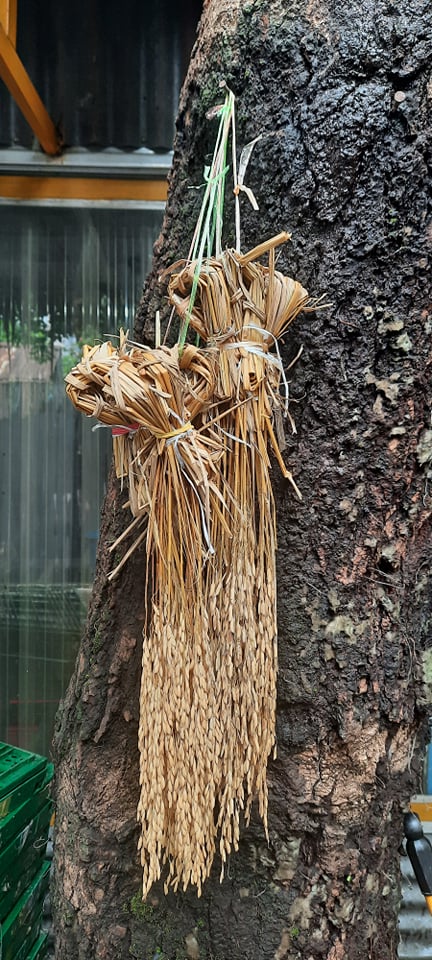
စာကုသို Sar Kudo. Photo credit: Kokkoya Organics
On the streets of Yangon one can sometimes see street vendors selling bunches of rice grains, these are known as “စာကုသိုလ် Sar Kudo”. 'Sar' means food and 'Kudo' means good deeds/merits. People would buy them and hang the rice outside their balcony or on trees as a feed/donation for passing by birds. Farmer Chit Kaung shared with us what စာကုသိုလ် Sar Kudo was like in the villages.
ကောက်သစ်စားပွဲ Kyout Thit Sa Pawe (New Rice Harvest)
 was held in Kyar Inn Paw Taw, Kayin State, Hpa-an.. Photo Credit BBC Burmese.jpeg)
Phibu Yaw Angel Paying Ceremony (Kauk Thit) was held in Kyar Inn Paw Taw, Kayin State, Hpa-an.. Photo Credit: BBC Burmese
In rural parts of Myanmar no matter the region or ethnicity almost everywhere one can find the practice ofကောက်သစ်စားပွဲ Kyout Thit Sa Pawe’. While this practice is still alive in rural towns/villages, people in lower Myanmar near Yangon area have stopped the practice for quite a long time.
Keywords: culture, demand, diversification, heirloom seeds, heritage, labour , shortage, survival, taste, spiritual, yield
Published 18 August 2021
.jpg)
.jpg)
.jpg)
